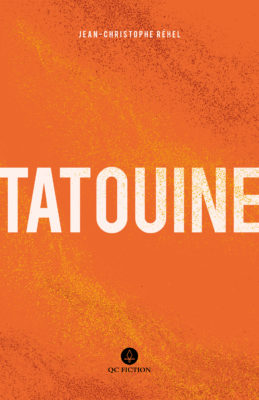We’ve all found ourselves daydreaming of a better life, fantasizing about a time and place where our deepest desires have become reality. For some, the conditions of existence may call for a little more fantasizing than for others. This can certainly be said for the central character in Jean-Christophe Réhel’s new novel in English translation, Tatouine. He suffers from cystic fibrosis, the money he inherited from his deceased father has run out, and a poet’s income isn’t going to pay the rent, so he finds himself taking – and quickly abandoning – a series of dead-end jobs. All the while, his obsession with a life on the planet Tatouine (his imagined version of the Star Wars planet Tatooine) bleeds further and further into an unsupportable reality.
Tatouine is by all appearances a work of autofiction. (A quick Google search verifies that Réhel himself has cystic fibrosis, and a touching scene with Norm, the central character’s landlord, reveals that the narrator shares his name with Saint Christopher, the patron saint of travellers). At first, the novel’s central conceit isn’t entirely convincing. Star Wars seems like an obvious and tired cultural reference to hang a narrative on. But Réhel gives the reader a front-row seat to a baroque and often hilarious interiority – one that highlights the complexity and tragedy of the human condition, while playfully revealing the capacity of the human mind for turning the struggles of existence, large and small, into a source of amusement. At his job in an isolated shoe-store stockroom, he claims: “I feel like Jack Nicholson in The Shining, but without the axe, the kid, and the wife.” In addition to the often-dark humour, Réhel has a poet’s eye for rhythm, repetition, and stark imagery that thankfully isn’t lost in the exceptional translation by Katherine Hastings and Peter McCambridge. His protagonist often engages in mental games, reconstructing accumulating fragments of thought into absurdist statements:
My wisdom tooth still hurts. It’s pumping like a heart. I wish I had a tooth instead of a heart, then I would feel something. I keep probing my tooth with my tongue and my fingers. I dunno, I think I’m making it worse. They were calling for snow, but it’s not snowing. I eat my Lucky Charms. I wish it would snow inside my tooth.

Tatouine
Jean-Christophe Réhel
Translated by Katherine Hastings and Peter McCambridge
QC Fiction
$23.95
paper
240pp
9781771862288
Tatouine is a novel steeped in the burden, shame, and absurdity of having a body. Cystic fibrosis looms like a darkening cloud over the protagonist’s life. He’s constantly coughing up bloody phlegm, battling a series of lung infections that inevitably force him into extended hospital stays. He struggles with his weight, all the while compulsively eating fast food. At the same time, the body is very much a source of hilarity. He develops an allergy to his medication that results in an itchy rash on his ass called “baboon syndrome.” In one of the novel’s funniest sequences, he’s forced to take a job as a mall Christmas elf in woefully undersized tights. And when reflecting on religion, he opines: “If Jesus had had a belly, I might have been a Catholic. I just can’t relate to such an athletic-looking guy.”
At times, the narrative’s constant state of self-reflection threatens to tip into self-absorption. But Réhel avoids this by giving us a character who is vulnerable, resilient, and charming. As a result, when things become truly unhinged in the closing chapters, the potential disaster of the situation is softened with the knowledge that he is loved and valued by those around him (even if he can’t see that for himself). mRb






0 Comments